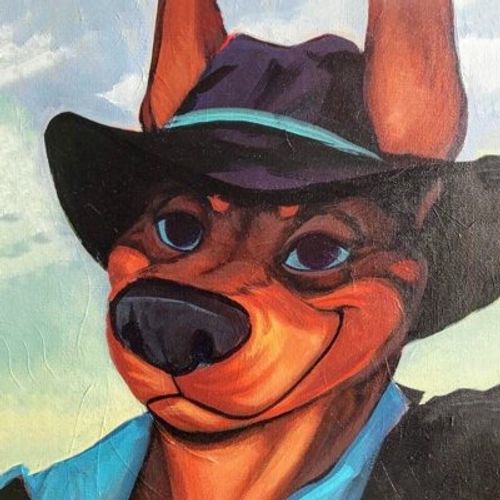full
"Three Tales of Ukkabal" by Ritter
Students of the great sage Junan learn three creation myths about their lost civilization of Ukkabal.
Today’s story is “Three Tales of Ukkabal” by Ritter, a musical husky with a passion for literature. You can find more of his stories, including the full Loom of Hours cycle, on AO3.
Read for you by Rob MacWolf — werewolf hitchhiker.
thevoice.dog | Apple podcasts | Spotify | Google Podcasts
If you have a story you think would be a good fit, you can check out the requirements, fill out the submission template and get in touch with us.
https://thevoice.dog/episode/three-tales-of-ukkabal-by-ritter
Transcript
You’re listening to The Voice of Dog.
Speaker:This is Rob MacWolf,
Speaker:your fellow traveler,
Speaker:and Today’s story is
Speaker:“Three Tales of Ukkabal”
Speaker:by Ritter, a musical husky with a passion for literature.
Speaker:You can find more of his stories,
Speaker:including the full Loom of Hours cycle,
Speaker:on AO3. Please enjoy
Speaker:“THREE TALES OF UKKABAL”
Speaker:by Ritter One day, some students were having a discussion about the origin of Man
Speaker:when they came to a disagreement that neither honey nor garum
Speaker:could assuage. For the sake of their friendship, they resolved to suspend the discussion
Speaker:and sought out the wisdom of their master,
Speaker:Junan, in the temple.
Speaker:“O Teacher,” they said,
Speaker:“where do we come from?”
Junan said:“Where you come from is what you make it.”
Junan said:The students, not understanding,
replied:“Where then do we come from:
replied:the gods who made us, or the men who made themselves?”
replied:At this, Junan lost his temper.
replied:“Idiot youngsters!
replied:Go bother the grounds-keeper with your foolishness;
replied:I have no time for sophistry.”
replied:Then he returned to attending the gods.
replied:The students heeded his words,
replied:and their legs took them to Kizun,
replied:the grounds-keeper.
replied:“Dear sir,” they said,
replied:“pray enlighten us - where do we come from?”
replied:This was Kizun’s reply: KIZUN’S TALE
replied:When the world was young and man and plant and beast still called each other equals,
replied:there was Speech, and speaking was Power,
replied:and every utterance was a violence upon the face of the land.
replied:Amid the seas of boiling rock and fields rampant with strangling fern
replied:came Ereakaiza,
replied:whose visage was silence
replied:(The chief and creator deity of the Ukkabali
replied:pantheon, Ereakaiza is noteworthy
replied:in that they are never referred to using any part of speech other than their name,
replied:as they are deemed “too important to be substituted with anything other than themselves.”
replied:(Humbert 1997)); and Ereakaiza gazed upon the land, where
replied:in their battles Lion and Stag cleft mountains in twain,
replied:and Ibex raised mighty Whale from geysers out of the deep. And Ereakaiza saw Millipede steal the legs from Slug and Snail,
replied:and Bat steal the wings from Emu. And Ereakaiza saw also that Wolf split Man from Man
replied:so that, enraptured by the beauty of his brother’s face and legs and breasts,
replied:Man would distract himself from the hunt
replied:and lay with his sprung-off kin;
replied:but instead, delight so possessed Man that he chased after Wolf
replied:to share with him these pleasures;
replied:and Wolf became Dog,
replied:who chased after Ox;
replied:and Ox became Cow,
replied:who chased after Horse.
replied:Then Ereakaiza, tiring of this chaos,
replied:came and choked the Word out of every creature,
replied:and all of them howled and mewled and squeaked
replied:and ululated in anger and dismay,
replied:but to no end: for Speech had gone out of them,
replied:and their word was no longer deed carven upon the earth.
replied:So the creatures learned to resolve their disputes with blows,
replied:and to this end grew claw and thorn and sting,
replied:while Man retreated to his delights
replied:and built yokes and vineyards and pleasure-domes. And Ereakaiza took pity upon Man, from whom Wolf
replied:had taken his hunter’s cunning,
replied:and allowed him to retain the most part of his Speech.
replied:And this is why people take such joy
replied:in creating figments and toying with words and colors;
replied:for we are as children playing with their parents’ tools,
replied:in the hopes that one day we may be allowed to wield them fully
replied:once more. Now Ereakaiza was content with the world,
replied:and wandered far afield to where the sands and the skies intertwine,
replied:in the place where neither Time nor Cause holds sway,
replied:and there made a dwelling,
replied:and listened as the earth and the wind and the sea
replied:wove together a song of primeval being.
replied:Ereakaiza slept then
replied:and sleeps still, dreaming of things long gone and things which we of the soil will not see come to pass.
replied:And all who come upon Ereakaiza’s form partake too of this slumber,
replied:for in this way they become party to blessed creation. *
replied:Some disciples were unsatisfied with this answer,
replied:and rather than resume the argument, they resolved to ask the street-sweeper,
replied:Bal-liao. “Dear madam,” they said, “pray enlighten us -
replied:where do we come from?”
replied:This was Bal-liao’s reply: BAL-LIAO’S TALE THE WRATH OF UKK
replied:The children of Man were not always scattered across the realms,
replied:for the Firstborn once regarded each other as siblings,
replied:dwelling in the same lands and dining at each other’s feasts
replied:and building great houses together as close kin are wont to.
replied:But a hard drought came and laid waste to the fields,
replied:and there was a want of food in the land
replied:such that many people were brought to the edge of death.
replied:The youngest of the Firstborn,
replied:who was named Inti,
replied:sought aid from Neb, who as eldest had first pick of the fruits of the earth.
replied:But Neb rebuffed him,
replied:and so Inti sailed to meet Kir,
replied:who as second-eldest had first pick of the fruits of the sea.
replied:But Kir, too, sent him away empty-handed,
replied:and so Inti went to meet Ukk ,
replied:who had not yet withdrawn from the world,
replied:and as third-eldest
replied:had rights to the herds of the vast plains.
replied:(Some scholars (Egidius 2001, Humbert 1997) note the similarity
replied:of the names “Neb” and “Kir”
replied:to the Egyptian neb (‘lord’)
replied:and the Greek kyrios (also ‘lord’).
replied:This resemblance is merely speculative, however.
replied:“Inti” is most likely a reference to the Indus region,
replied:although Cauvin (2011)
replied:provides surprising evidence to suggest that it may refer to the Incan
replied:sun god of the same name.
replied:“Ukk”, of course, forms the etymological root of the city of Ukkabal,
replied:which the hero is said to have founded.)
replied:Ukk’s heart was filled with mercy, and he gave to Inti a third part of his herds,
replied:and a third part of his lands between the mountains and the sea, where Inti and his family could settle and make themselves a new home.
replied:For a time, prosperity blessed the siblings,
replied:and their fortunes and families grew. While
replied:Neb’s children settled the fertile deltas beyond their homelands,
replied:Kir’s children journeyed across the seas, and Ukk’s spread throughout the plains on horseback and ox.
replied:But Inti’s children were confined to the lands between the mountains and the sea,
replied:and soon enough, the land was not enough to hold them,
replied:nor the soil rich enough to sustain their herds,
replied:and they began to fear once more that starvation and death would be their doom.
replied:So they conspired to invade Ukk’s lands while he was away,
replied:inspecting the new borders of his realm;
replied:and they drove forth women and children and cattle alike,
replied:ransacking their houses and storming their fields.
replied:When Ukk heard of this,
replied:he was become wroth,
replied:and immediately flew to his siblings to seek aid and counsel.
replied:But Neb rebuffed him, as he had done to Inti,
replied:and Kir too rebuffed him,
replied:as she had done to Inti.
replied:So Ukk, in his wrath, swore an oath to sever kin from kin,
replied:invoking the gods who dwelt in the mountains,
replied:and they, being beholden to Man,
replied:had no choice save to uphold it.
replied:But they, not wishing to see the blood of Man spilt upon the continent,
replied:also opened the Ways so that Ukk might take his leave and start anew in a strange land. So Ukk
replied:gathered his wives and his children,
replied:and they rode for the Ways,
replied:out of deference for the gods who had birthed Them.
replied:But on the way, they came across Inti and his children,
replied:who had grown fat upon the land;
replied:and Ukk was filled with rage.
replied:He drove them before him, chasing them into the Ways,
replied:and would have followed them out again, into the mountains of a new world,
replied:had not the gods closed off that passage before his horse could get through.
replied:Only then did Ukk settle in the land of the Ways,
replied:raising the first city, UKKABAL,
replied:upon the figure of the Sleeping God.
replied:From there did his children expand out,
replied:filling the rest of the land,
replied:and they kept good watch over the Ways,
replied:lest curious minds wander in or out
replied:and bring the strife of the First Siblings
replied:with them. (Linguistic analysis suggests that this is a sanitized pastiche of two different folktales,
replied:both of which have long been known to scholars.
replied:In one of the original stories, Ukk slaughters Inti and his children, and is exiled by the gods to the land of the Ways.
replied:In the other story, it is Inti
replied:who is exiled, but Ukk grows jealous of him and usurps his position,
replied:banishing him to the ‘new world’ instead. Runao, the courtier who compiled these stories, may have thought both versions unsuitable for his charges,
replied:or may have had philosophical reasons to challenge them.
replied:Such speculation is beyond the scope of this work.) *
replied:Still some disciples were unsatisfied with this, so they returned to the temple and brought their query before their master,
replied:Junan, once more.
replied:“O Teacher,” they said,
replied:“we have asked Kizun, the grounds-keeper,
replied:and we have asked Bal-liao,
replied:the street-sweeper,
replied:but we still do not know where we come from.”
replied:Junan sighed. “Silly children,” he said.
replied:“Come, let me tell you a tale, then, and hopefully then you shall be satisfied.”
replied:This was what Junan said: JUNAN’S TALE THE MAGISTRATE AND THE CROW
replied:Once, there was a powerful magistrate who was known throughout the land for his wisdom, fairness, and knowledge.
replied:He lived in a terraced house far above the city,
replied:where many would travel from far and wide to hear his opinion on sundry matters.
replied:It so happened that one day,
replied:a young crow landed in the magistrate’s courtyard
replied:with its wing broken.
replied:The magistrate, taking pity on the poor creature,
replied:took it in and attempted to mend it.
replied:But none of his strengths were in the art of healing,
replied:and so the magistrate had to pore over his books, make many a failed poultice,
replied:and consult with healers before he could care fully for his new charge.
replied:He nursed the crow back to health,
replied:and over this time formed a strong bond with it,
replied:so that it always returned to his side,
replied:singing when the magistrate played music,
replied:and listening intently when he discoursed about law and philosophy.
replied:One morning, the magistrate was taken gravely ill,
replied:and had to retire to bed.
replied:He fell into a deep, deep sleep, from which none thought he would waken.
replied:In that sleep, he dreamt that he was a young chick,
replied:chirping desperately for its mother,
replied:gobbling down whatever new grub she came by to deliver.
replied:He dreamt that he was a fledgling,
replied:learning to spread its wings for the first time,
replied:soaring over the woods and the fields and the cities that men had built.
replied:He dreamt that he was a bird,
replied:picking at the ground, getting into a squabble with another bird,
replied:flying with the stabbing pain of a broken wing into an enclosed garden,
replied:where a kindly man picked him up with soft hands
replied:and laid him upon a table.
replied:When the magistrate awoke from his slumber,
replied:he opened his window to find his friend the crow,
replied:who had waited all this time in the trees outside.
replied:“My friend,” said the magistrate,
replied:“I know now who you are and what is meant for us,
replied:and it pains me what I must do,
replied:but there is no way around it.
replied:For you must seek new lands instead of returning to me
replied:(to me); and you must carry my spirit where I am not
replied:(am not). Thus, by the power of my station and the sacredness of our bond,
replied:I banish you from this city and this land,
replied:never to see your plumage or hear your cry ever again.”
replied:And the crow nuzzled the magistrate’s arm,
replied:took to the heavens,
replied:and was never seen again in those parts until the magistrate’s death.
replied:(Junan’s Tale takes the form of philosophical parables
replied:common to the classical Middle Kingdom period and similar to the Buddhist koan.
replied:Confounding allegories are presented straightforwardly,
replied:with the intention that students meditate upon them until they become enlightened to the metaphor. Leading theories about Junan’s Tale suggest that it is meant as a representation of the cyclic nature of gods and mortals -
replied:that the gods, finding themselves in the bodies of men,
replied:must inevitably depart from their home in order to spread their wisdom,
replied:resisting the impulse to return to their core selves in the process.
replied:See Egidius, Prophets of the Times: Bronze-Age Divination in Runao’s Book of Hours (2001), p. 164 for more details on this interpretation.) *
replied:“Do you understand now the three parts to the answer?” said Junan.
replied:(The more commonly known version of this question - “Do you understand now that there are three parts to the answer?” (emphasis added) -
replied:is a mistranslation,
replied:popularized by Burton
replied:(1888).) And the students were enlightened.
replied:This was “Three Tales of Ukkabal”
replied:by Ritter, read for you by Rob MacWolf, werewolf hitchhiker.
replied:You can find more stories on the web at thevoice.dog,
replied:or find the show wherever you get your podcasts.
replied:Thank you for listening
replied:to The Voice of Dog.


